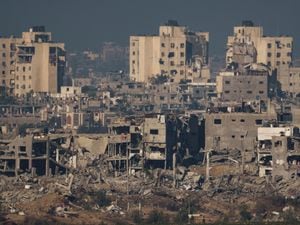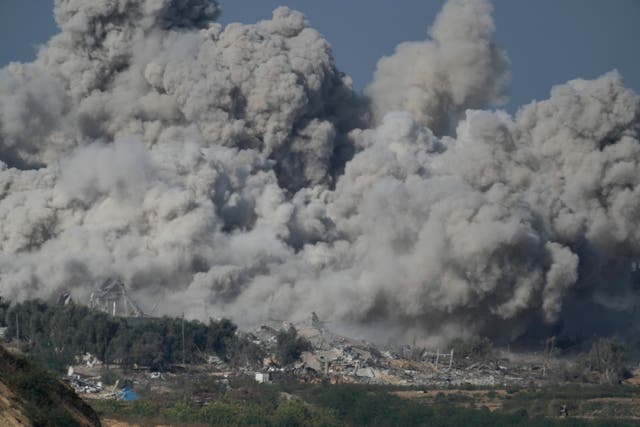Internet and phone networks collapse in Gaza, worsening humanitarian crisis
Meanwhile, Israeli troops for a second day searched Shifa Hospital in the north for traces of Hamas.

Internet and telephone services collapsed across the Gaza Strip on Thursday for lack of fuel, the main Palestinian provider said, bringing a potentially long-term communications blackout.
The collapse came as Israel signalled its offensive could next target the south of the territory, where most of the population has taken refuge.
Meanwhile, Israeli troops for a second day searched Shifa Hospital in the north for traces of Hamas.
They displayed guns they say were found hidden in one building, but have yet to release any evidence of the central Hamas command centre that Israel has said is concealed beneath the complex.
Hamas and staff at the hospital, Gaza’s largest, deny the allegations.
The military said it found the body of one of the hostages abducted by Hamas, Yehudit Weiss, 65, in a building adjacent to Shifa, where it said it also found assault rifles and RPGs. It did not give the cause of her death.
The communications breakdown threatens to worsen the severe humanitarian crisis in southern Gaza, where Israeli airstrikes continue.
Food, water and electricity are increasingly scarce, and the UN is struggling with fuel shortages of its own to deliver aid and help hospitals keep operating.
Most of Gaza’s population of 2.3 million is crowded into southern Gaza, including hundreds of thousands who heeded Israel’s calls to evacuate the north to get out of the way of its ground offensive.
If the assault moves into the south, it is not clear where they would go, as Egypt refuses to allow a mass transfer on to its soil.
The latest internet and telephone blackout threatens to last long-term.

The main provider, Paltel, said it had run out of fuel to run the network, and Israel has barred entry of new supplies.
Gaza’s fragile communication network has broken down several times during the conflict because of bombardment or shutdowns by Israel, but each time Gaza authorities were able to quickly get it back working.
Previous blackouts have traumatised Palestinians, leaving them unable to call ambulances or reach dispersed family members to ensure they are alive amid the bombardment.
Aid workers say it hampers humanitarian operations and hospitals.
The blackout also largely cuts Gaza off from the outside world, making it even harder for international media to cover events on the ground.
Some manage to keep up communications using satellite phones or sim cards that reach the Israeli or Egyptian networks.
The war, now in its sixth week, was triggered by a wide-ranging Hamas attack into southern Israel on October 7 in which the militants killed more than 1,200 people, mostly civilians, and captured some 240 men, women and children.

Israel responded with a weeks-long air campaign and a ground invasion of northern Gaza, vowing to remove Hamas from power and crush its military capabilities.
More than 11,470 Palestinians have been killed, two-thirds of them women and minors, according to Palestinian health authorities.
Another 2,700 have been reported missing, with most believed to be buried under the rubble.
The official count does not differentiate between civilian and militant deaths, and Israel says it has killed thousands of militants.
The war has inflamed tensions elsewhere. On Thursday, gunmen shot and wounded four people at a checkpoint on the main road linking Jerusalem to Israeli settlements in the occupied West Bank.
The three attackers were killed, according to police, who said the assailants had assault rifles, handguns and hatchets, and were preparing a large-scale attack in Jerusalem.
Israeli troops stormed into Gaza’s largest hospital Wednesday, where newborn babies and hundreds of other patients have suffered for days without electricity and other basic necessities.
Troops searched the underground levels of the hospital on Thursday and detained technicians responsible for running its equipment, Gaza’s Health Ministry said in a statement.
After encircling Shifa for days, Israel faces pressure to prove its claim that Hamas used the patients, staff and civilians sheltering there to provide cover for its fighters.
The allegation, which the US has said it has intelligence to support, is part of Israel’s broader accusation that Hamas uses Palestinians as human shields.
The military released video from inside Shifa showing three duffel bags it said it found hidden around an MRI lab, each containing an assault rifle, grenades and Hamas uniforms, as well as a cupboard that contained a number of assault rifles without ammunition clips.
The Associated Press could not independently verify the Israeli claims that the weapons were found inside the hospital.
Hamas and Gaza health officials deny militants operate in Shifa, a hospital that employs some 1,500 people and has more than 500 beds.
Palestinians and rights groups accuse Israel of recklessly endangering civilians.

Munir al-Boursh, a senior official with Gaza’s Health Ministry inside the hospital, said troops ransacked the basement and other buildings, and questioned and scanned the faces of patients, staff and people sheltering in the facility.
Israeli forces fought militants outside the hospital for days, but there were no reports of militants firing from inside Shifa, or of any fighting within the hospital after Israeli troops entered.
The Health Ministry said 40 patients, including three babies, have died since Shifa’s emergency generator ran out of fuel on Saturday.
There was no word on the condition of another 36 babies, who the ministry said earlier were at risk of dying.
The military said its soldiers were accompanied by medical teams bringing in incubators and other supplies, though staff said incubators were useless without fuel.
Israeli forces also dropped leaflets telling Palestinians in areas east of the southern town of Khan Younis to evacuate and said anyone in the vicinity of militants or their positions “is putting his life in danger”.
Similar leaflets were dropped over northern Gaza for weeks ahead of the ground invasion.

Two reporters who live east of Khan Younis confirmed seeing the leaflets. Others shared images of the leaflets on social media. The military declined to comment.
Even as Israel signals a wider offensive, it has yet to put forth a long-term plan, aside from saying it will maintain security control over Gaza indefinitely.
The US has urged Israel not to reoccupy the territory, from which it withdrew soldiers and settlers in 2005.
The Biden administration supports the eventual creation of a Palestinian state including Gaza and the occupied West Bank – also the long-held aspiration of the Palestinians.
Israel’s government was staunchly opposed to Palestinian statehood even before the war.
The military says it has largely consolidated its control of the north, including seizing and demolishing government buildings.
Video released by the army Thursday showed soldiers moving between heavily damaged buildings through holes blown in their walls.

The military said it had blown up a residence belonging to Ismail Haniyeh, a senior Hamas leader based abroad. It was unclear if anyone was inside the building.
With most of Gaza’s 2.3 million people crowded into the territory’s south, residents say bread is scarce and supermarket shelves are bare.
Families cook on wood fires for lack of fuel. Central electricity and running water have been out for weeks.
The worsening fuel shortage threatens to paralyse the delivery of humanitarian services, and Palestinian telecoms provider Paltel said Thursday it caused landline connections, the mobile network and internet connections to shut down.
Gaza has experienced three previous mass communication outages since the ground invasion.
Israel allowed a small amount of fuel to enter Gaza on Wednesday, for the first time since the war began, so that the UN agency for Palestinian refugees could continue bringing limited supplies of aid.
The fuel cannot be used for hospitals or to desalinate water, and covers less than 10% of what the agency needs to sustain “lifesaving activities”, said Thomas White, the agency’s Gaza director.





